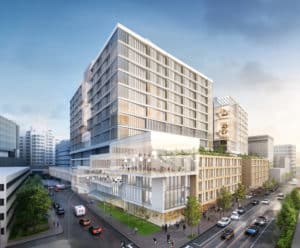State regulators on Wednesday gave Mass General Brigham the green light to move ahead with a pair of projects at Boston hospitals, expansions the system says will help address capacity constraints.
The Public Health Council voted to approve a $150 million plan involving additions and renovations at Brigham and Women’s Faulkner Hospital in Jamaica Plain and a $1.9 billion project at Massachusetts General Hospital that includes a pair of connected towers along Cambridge Street in the West End.
“The two new buildings at MGH and the addition of new inpatient floors at the Faulkner will significantly enhance our ability to provide the highest level of care for patients, increasing access and enhancing the care experience,” MGB President and CEO Dr. Anne Klibanski said in a statement. “Moving these projects forward is a major step in accomplishing what is best for our patients. Mass General Brigham is committed to working in partnership with the state to lower the cost of healthcare in Massachusetts, while building a new continuum of care, ultimately improving patient health outcomes.”
The approvals come as MGB is facing scrutiny from another state agency over its spending. The Health Policy Commission has given the state’s largest hospital system until May 16 to submit a performance improvement plan aimed at controlling cost growth.
Before the vote, the council heard statements of support for the Faulkner project from Reps. Nika Elugardo and Ed Coppinger, both patients at the hospital, and Sen. Mike Rush. Elugardo said the hospital has done a good job explaining to the community how the new 78 inpatient beds will help meet demand in the surrounding neighborhoods.
In January, when the HPC voted to require the performance plan, it also published an analysis cautioning that a trio of MGB expansion plans were likely to result in increased health care spending. At the time, MGB was also pursuing an ambulatory care expansion in Westborough, Westwood and Woburn, which it withdrew after learning the public health officials would not recommend approval.
In-Depth With The Faulkner Project
On the Faulkner project, Elizabeth Kelley of the DPH’s Bureau of Health Care Safety and Quality said department staff believed the HPC’s findings on costs and market share were more accurate than those in an independent cost analysis commissioned as part of the determination of need process.
However, she said, “the numbers are small enough that with conditions, the proposed project will not have an appreciable impact on the cost containment goals of the commonwealth, but will have a significant positive impact on public health outcomes and delivery system transformation and therefore may move forward.”
Conditions attached to the Faulkner expansion include annual data reporting on topics like transfers to and from Brigham and Women’s Hospital and emergency department boarding, and a $7.5 million required contribution to community health initiatives.
The Mass. General Hospital approval also involved data-reporting conditions, and the required community health contribution for that pricier project lands at more than $93 million.
Kelley said determination of need approvals also feature standard conditions for entities the HPC is requiring to complete a performance improvement plan, though Mass General Brigham is the first to face that requirement. If MGB does not comply with the improvement plan, it will have to report to the Department of Public Health on why it should still be deemed in compliance with the terms of its expansion approvals.
New Boston Tower OK’d
MGB’s expansion proposal for Mass General Hospital sought to add a net of 94 new beds in its new tower, while also replacing existing semi-private beds with private rooms.
Kelley said that the DPH staff “sees significant concerns” with that request and the potential spending impacts from added inpatient capacity at MGH, and the department recommended disapproval of the additional beds while allowing the broader tower project to proceed. The tower also includes an entrance to a planned MBTA Blue Line extension that would connect the subway with its Red Line counterpart
Conditions stipulate that if MGB comes back to request adding any of the 94 beds, it must submit data on the number of patients waiting for beds and other factors.
“This project will transform our campus with state-of-the-art facilities, expanding access to complex care in cancer and cardiology, and adding more single-bed patient rooms,” MGH President Dr. David Brown said. “Now with the Public Health Council’s approval, we are one step closer to being able to care for our patients in an environment that offers the comfort and privacy that they and their families deserve.”
Rep. Jay Livingstone, Chelsea City Manager Tom Ambrosino, Boston City Councilor Kenzie Bok and Clare Kelly from Mayor Michelle Wu’s office spoke in support of the plan.
Reading a letter from Wu, Kelly said the two proposals are expected to bring thousands of union construction jobs and hundreds of permanent health care jobs to Boston.
“We also believe that the project represents a catalytic investment to establish broader and more equitable access to jobs and health care in Boston, envision a multimodal Cambridge Street, improve public transportation to Logan Airport, and advance the long-missing link in our public transportation system between the Red Line and the Blue Line,” the letter said.




 |
| 


